Hitachi Deskstar 7K1000: Terabyte Storage arrives on the Desktop
by Gary Key on March 19, 2007 8:00 AM EST- Posted in
- Storage
PCMark05 Performance
We are utilizing the HDD test suite within PCMark05 for further comparative hard disk scores as it provides a mixture of actual application results and specific read/write percentages utilized within these programs. It is also a readily available benchmark that others can use for comparative purposes. The program utilizes the RankDisk application within the Intel iPeak SPT suite of tools to record a trace of disk activity during usage of real world applications. These traces are then replayed to generate performance measurements based upon the actual disk operations within each application. The HDD test suite contains 53% read and 47% write operations with each trace section utilizing varied amounts of read or write operations. Additional information about the test suite can be found in PDF format here PCMark05 whitepaper.
The PCMark05 test results are based upon the following trace runs:
Windows XP Startup: This test consists of 90% reading and 10% writes that tracks XP activities at start-up.
Application Loading: This test consists of 83% reading and 17% writes that tracks the opening and closing of the following programs.
File Write: This test consists of 100% write activities by writing 680MB of files onto the hard disk.
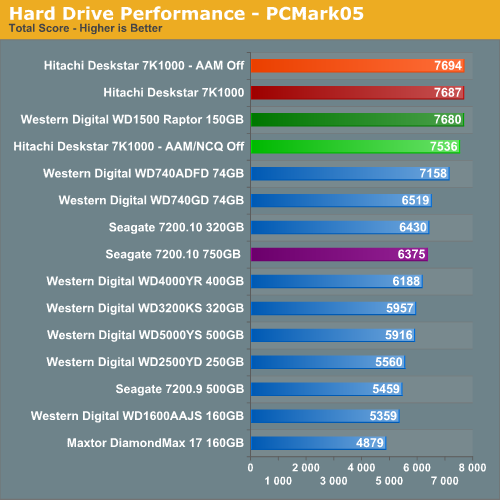
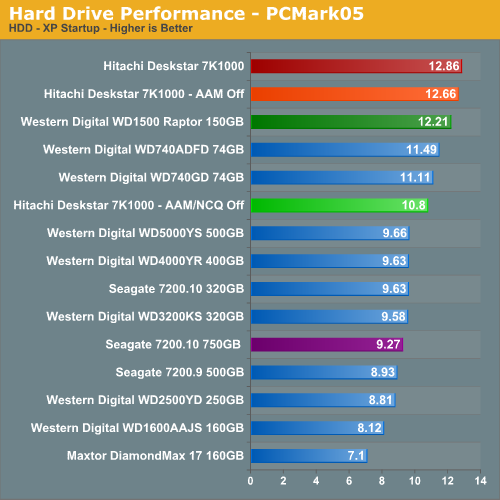
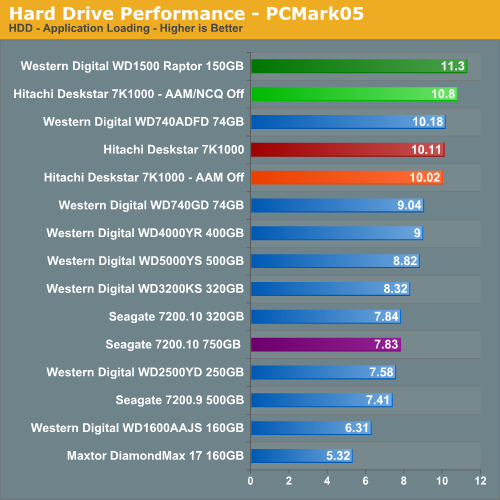
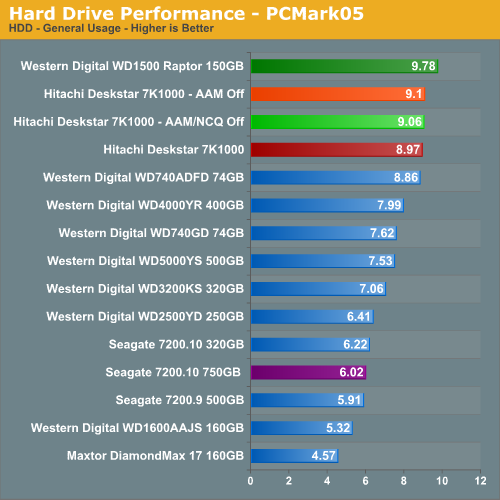
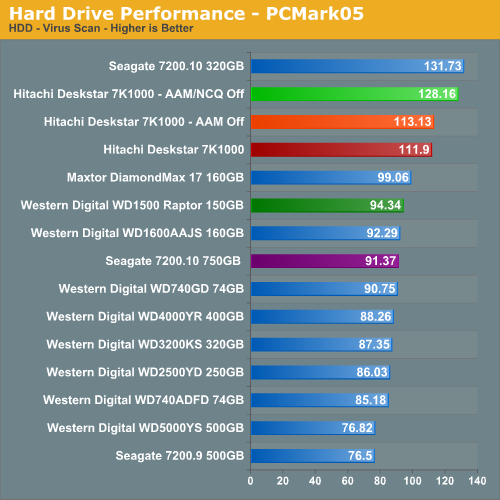
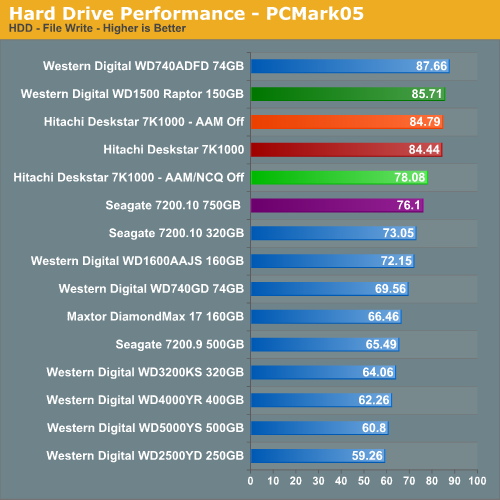
Our PCMark05 numbers surprised us with the 7K1000 scoring better than our previous champion, the WD 150GB Raptor. The performance delta between the 7K1000 and WD1500AHFD is minimal with the major differences occurring in the General Usage and Application sections of the test where combined write and read speeds favor the Raptor's rotational/access speeds while the 7K1000 scores extremely well in the Virus Scan tests especially when both AAM and NCQ are turned off.
We are providing test results with the 7K1000 in this series of benchmarks with AAM/NCQ on, AAM/NCQ off, and NCQ on only. The overall score goes to the NCQ only configuration but the AAM/NCQ on configuration only finishes 7 points behind. It was a toss up between the two configurations with the tests where read operations were prevalent benefiting the NCQ only setup. This is to be expected as random access times are about 30% slower with AAM on but it does not correlate to a noticeable difference in performance. This is one drive where you can have it quiet and fast at the same time. Our recommendation is to leave AAM and NCQ on unless you spend your day benchmarking virus scan programs.
We are utilizing the HDD test suite within PCMark05 for further comparative hard disk scores as it provides a mixture of actual application results and specific read/write percentages utilized within these programs. It is also a readily available benchmark that others can use for comparative purposes. The program utilizes the RankDisk application within the Intel iPeak SPT suite of tools to record a trace of disk activity during usage of real world applications. These traces are then replayed to generate performance measurements based upon the actual disk operations within each application. The HDD test suite contains 53% read and 47% write operations with each trace section utilizing varied amounts of read or write operations. Additional information about the test suite can be found in PDF format here PCMark05 whitepaper.
The PCMark05 test results are based upon the following trace runs:
Windows XP Startup: This test consists of 90% reading and 10% writes that tracks XP activities at start-up.
Application Loading: This test consists of 83% reading and 17% writes that tracks the opening and closing of the following programs.
- Microsoft Word
- Adobe Acrobat Reader
- Windows Media Player
- 3Dmark 2001SE
- Leadtek WinFast DVD
- Mozilla Internet Browser
- Opening a Microsoft Word document, performing grammar check, saving and closing
- Compression and decompression using WinZip
- Encrypting and decrypting a file using PowerCrypt
- Scanning files for viruses using F-Secure Antivirus
- Playing an MP3 file with Winamp
- Playing a WAV file with Winamp
- Playing a DivX video using the DivX codec and Windows Media Player
- Playing a WMV video file using Windows Media Player
- Viewing pictures using Windows Picture Viewer
- Browsing the Internet using Microsoft Internet Explorer
- Loading, playing and exiting a game with Tom Clancy's Ghost Recon
File Write: This test consists of 100% write activities by writing 680MB of files onto the hard disk.






Our PCMark05 numbers surprised us with the 7K1000 scoring better than our previous champion, the WD 150GB Raptor. The performance delta between the 7K1000 and WD1500AHFD is minimal with the major differences occurring in the General Usage and Application sections of the test where combined write and read speeds favor the Raptor's rotational/access speeds while the 7K1000 scores extremely well in the Virus Scan tests especially when both AAM and NCQ are turned off.
We are providing test results with the 7K1000 in this series of benchmarks with AAM/NCQ on, AAM/NCQ off, and NCQ on only. The overall score goes to the NCQ only configuration but the AAM/NCQ on configuration only finishes 7 points behind. It was a toss up between the two configurations with the tests where read operations were prevalent benefiting the NCQ only setup. This is to be expected as random access times are about 30% slower with AAM on but it does not correlate to a noticeable difference in performance. This is one drive where you can have it quiet and fast at the same time. Our recommendation is to leave AAM and NCQ on unless you spend your day benchmarking virus scan programs.










74 Comments
View All Comments
mino - Tuesday, March 20, 2007 - link
Sorry Jared, didn't saw you comment...Otherwise, thanks for a nice review. Especially that explanation of AAM.
Many guys ask me reguraly why I don't buy non-AAM drives...
yacoub - Monday, March 19, 2007 - link
51C is a bit warm for a HD, no? I wonder how that impacts its life expectancy...yyrkoon - Tuesday, March 20, 2007 - link
To be a bit more specific, I think it was google who did testing of enterprise type drives, and did a bunch of testing, I'm sure google will turn something up ;)yyrkoon - Monday, March 19, 2007 - link
According to multiple studies done, HDD life expectancy is not affected by heat. I'm sure there are situations, where you literally have parts melting, that could be problematic, but there you have it.Justin Case - Wednesday, March 21, 2007 - link
Yes and no. A temperature around 50-60 ºC will not slowly "cook" the drive, but if it rises above a certain level (ex., 120º C), it can kill it instantly. Fast drives with a lot of platters can get hot very quickly, and if they're mounted on plastic rails (poor thermal conductors) with poor air circulation, their life expectancy is probably less than a day. I've seen it happen more than once.yyrkoon - Thursday, March 22, 2007 - link
Boiling point of water is around ~191F-212F, 120C is 248F, a CPU could not handle this temperature, what makes you think a HDD could ? Most consumer grade electronic do not take kindly to anything hottter than ~70C-80C. The only exception I can think of in a computer, might possibly be a graphics card, and even then, I personally would not expect it to last long as these temperatures.Most computers will not / should not exceed ~40C-50C ambient case temperature, and a lot (mine included) run much cooler. It is not uncommon for my CPU to run sub 100F (winter time), and sub 120F (summer time) under a load. Most of the time, the ambient case temperature of my case is easily under 105F.
Anyhow, the whole point here is: practise common sense with your electronics concerning heat. 120C is obviously WAY too hot for a HDD, as well as most consumer grade electronics. This also doesnt negate the fact that several studies have been done in enterprise envoirnments, to prove that heat ( again, within reason ) is not a factor in HDD falure. The whole point of these studies were to prove ( or disprove ) the point of buying enterprise grade hard drives vs. regular HDDs.
I have always wondered why you guys ( who ever claims that HDD fails often ) buy new HDDs with your new system, now I think I know ;)
phusg - Tuesday, March 20, 2007 - link
Please refer us to these multiple studies. AFAIK the only one that corroborates this is the google one, which you mention in a later post. Also I'd question this one study's relevance to home use, as not everyone leaves their drives running 24/7 as google does. My personal feeling is that repeated expansion and contraction damages drives most, and obviously if the drive is running hotter then the expansion will be greater and so will the damage to the longevity of the drive.yyrkoon - Thursday, March 22, 2007 - link
What you're reffering to is known as 'Hysteresus'. Excuse the bad spelling, if I misspelled that (it is not a word I used often). Anyhow, this is the effect, that rapid cooling / heating has on an object over time, and the object eventually becomming brittle because of this.As for the refferal, use google. Do not expect everyone to do your homework for you ;) However, I can tell you that, I personally have many HDDs, some of which are over 12 years old, have seen a lot of heat in their time, and are fully functional. One of which is a 80MB Maxtor . . .
Spoelie - Tuesday, March 20, 2007 - link
According to my own experience that's not really true. Last summer I had trouble with my main OS drive (a Seagate 7200.8 160GB) where windows would slow to a grind, there were multiple IO errors in the event log, then DMA would switch off and corrupt data showed up on the disc. I thought it died to be honest.However, before throwing it out I tried upping the cooling. I had 3 Seagate HDs in the HD chamber in front without intake fans, and they were incredibly warm to the touch. Directing a 120mm 800rpm fan over them to test immediately solved all issues, and the drive was as reliable again as ever (no permanent damage even). They're now very cool to the touch. Kinda obvious when I think about it, in a normal case the drive makes metal to metal contact and the HD bay itself functions as a large heat sink, while in the Antec there is no contact at all and the drive is "suspended in the air" on rubber grommets.
It was a particular hot summer period but still, heat shouldn't be ignored.
Gary Key - Monday, March 19, 2007 - link
It is well within the drives operating range and remember the temp dropped to 43C once we turned the front fan on in the case. I was expecting it to run warmer actually.